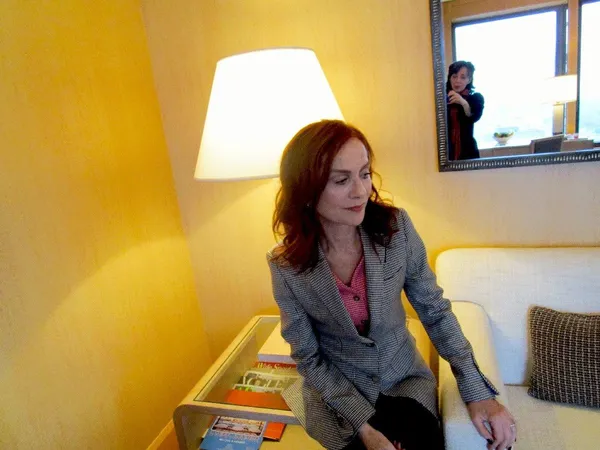 |
| Isabelle Huppert in a beautiful Burberry vest and jacket on Joan Crawford and movie star shoes in Mildred Pierce: "My favourite ever!" Photo: Anne-Katrin Titze |
Ira Sachs' Frankie, co-written with longtime collaborator Mauricio Zacharias (Little Men, Love Is Strange, Keep The Lights On), starring Isabelle Huppert in the title role, with Brendan Gleeson, Jérémie Renier (Clément Cogitore's Neither Heaven Nor Earth, Jean-Pierre Dardenne and Luc Dardenne's The Unknown Girl), Marisa Tomei, Pascal Greggory (Olivier Assayas' Non-Fiction), Greg Kinnear, Vinette Robinson, Ariyon Bakare, Carloto Cotta, and Sennia Nanua, shot by Rui Poças (Lucrecia Martel's Zama, Miguel Gomes' Tabu) in Sintra, Portugal, had its world première at the Cannes Film Festival.
 |
| Frankie (Isabelle Huppert) with her son Paul (Jérémie Renier) |
At the Four Seasons on a stormy afternoon in New York, Isabelle connected Werner Schroeter's Two, Michael Haneke's The Piano Teacher, Chantal Akerman, costume designer Khadija Zeggaï, and the magic of Sintra for the first half of our conversation on Frankie.
One day in the beautiful town of Sintra near Lisbon. Frankie (Huppert) has gathered those near and dear to her for a vacation. She knows she is going to die soon and wants to put her affairs in order as she sees fit. Ira Sachs structures the film as a jumbled relay race, where one-on-one conversations between family and friends lead into one another. The miraculous Portuguese landscape shifts from forest to beach to hilltop and the clouds can change the mood in an instant.
Frankie, an actress, has to sort out things with her husband (Gleeson) and ex-husband (Greggory). Her friend Ilene (Tomei), a hairdresser we are told she met on the set of a Noah Baumbach movie, seems to be a perfect match for Frankie’s son Paul (Renier). Or so she plots. Only that Ilene brought along to Sintra her boyfriend Gary (Kinnear), a cinematographer, who wants to 1. Direct his first movie, 2. Move to Watermill, Long Island and 3. Marry Ilene.
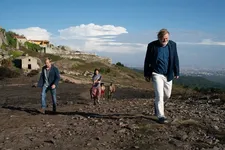 |
| Paul (Jérémie Renier) with Ilene (Marisa Tomei) and Frankie’s husband Jimmy (Brendan Gleeson) |
We stumble upon a local’s birthday party, Frankie’s teenage stepdaughter Maya (Nanua) meets infatuation on the beach, and an ancient well promises legendary healing qualities.
Frankie, that is Isabelle Huppert, is amazingly adept to hike in platform heels and never stumbles in that respect. She shows no physical signs of illness, making perfectly clear that we all carry death within us. But for now, there is life and watching. Watching people watching and watching the clouds.
Anne-Katrin Titze: We have a beautiful view from the 38th floor of the Four Seasons. With the rain, maybe not as beautiful as Sintra.
Isabelle Huppert: Different.
AKT: Different, yes, that's it. I love Sintra, I've been there twice. It's a fantastic place. Was that part of the allure for you?
IH: Yes. I've been in Sintra before. I did another film in Sintra.
AKT: Which film was that?
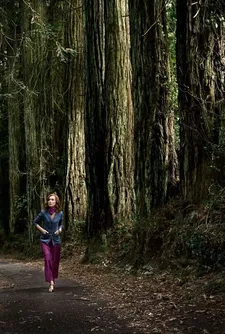 |
| Isabelle Huppert on Sintra: “It's so full of hidden places, it's so rich. It's going to be very different whether you're in the woods or overlooking the sea.” |
IH: It was called Two. Deux, directed by Werner Schroeter, who is a wonderful German director. So I really knew well that place and I had been there, not for vacation, but, you know, I'd been to Lisbon many times. So necessarily when you go to Lisbon, you go to Sintra. So yes, it's a place I really know well.
But even if you know it well, it's the mere experience to do another film there, you have a different approach. And it's so full of hidden places, it's so rich. It's going to be very different whether you're in the woods or overlooking the sea. It's no wonder Ira among others was kind of fascinated with this place.
AKT: Lord Byron loved it.
IH: Lord Byron, yes. And it says the forest has some kind of magical power and something a bit weird going on in it.
AKT: It felt like it when we see you wandering around there. It makes you think, what is this? Canterbury Tales? A Midsummer Night's Dream?
IH: Exactly. Absolutely. And some moments, when you have the way Ira films nature, with clouds, it's almost like a Japanese painting. It becomes almost abstract in a way.
I like the way the nature is real, but it also raises other images than just the images you watch. It's like what you said, all of a sudden it's like you are in a tale. When I go into the woods, into the dark, it's magic.
AKT: At the same time, during one of the scenes I liked best, when they are starting to talk about the princess and the fountain …
IH: Yes, the miraculous water.
AKT: … and the water has healing power. As a spectator, I was fully going along with this and then comes your reaction. As this woman who is dying, you push us back into reality.
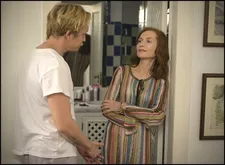 |
| Paul (Jérémie Renier) with Frankie (Isabelle Huppert): “The way she doesn't want to leave money to her own son. All of this is quite harsh.” |
IH: Into rationalism.
AKT: Frankie is completely upset at this moment.
IH: Probably out of anguish and anxiety. If you watch someone die, yes, you want to do everything possible to stop the disease. She doesn't believe in it. They do it out of anxiety and she does it out of anxiety as well. Go back to reality! Don't drag me into this bullshit over magic.
AKT: It's a lot about control and losing control.
IH: Yes and what's interesting about the movie is that she's a sick, ill person, but she's not a victim. She's never shown as a victim and actually you see no exterior signs of disease. If we didn't know that she was ill, if she didn't say it in that beautiful scene with Marisa. When she says "Yes the cancer has progressed," she obliges the audience to acknowledge that she is a dying person.
But if it weren't for these moments you couldn't tell. So the movie deliberately is about something else. It's about control, life and all that it implies, within the members of this kind of strange family and friends. Which means mysteries, lies, secrets. Which means narcissism, too. I mean, the way she thinks her money should be used after she dies.
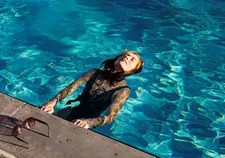 |
| Isabelle Huppert in Guillaume Nicloux’s Valley of Love |
AKT: The way she wants to match up people.
IH: Yes, and the way she doesn't want to leave money to her own son. All of this is quite harsh.
AKT: The bracelet!
IH: Yeah, the bracelet.
AKT: Which is somewhere in the forest, lost forever. People can go and try to find it.
IH: Try to find the Bulgari bracelet.
AKT: I always end up talking to you about shoes.
IH: Ha, that's interesting.
AKT: In this case, I was reminded of an essay I read a while ago about Joan Crawford and movie star shoes in Mildred Pierce.
IH: My favourite ever!
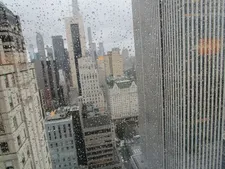 |
| View from the 38th floor at the Four Seasons in New York Photo: Anne-Katrin Titze |
AKT: And she is wearing movie star shoes no matter the character's circumstances from beginning to end. And so does Frankie, who is an actress. You are walking in these unbelievable shoes in the forest.
IH: I know! First of all, it's interesting what you said, because I do believe that you find your characters in your shoes in a way. It reminds me of something that Chantal Akerman once said, you know. She was asked "Where do you find this idea?" And she said "In my shoe." But for an actress, it's not far from being true.
I think whether you have flat shoes like I had in The Piano Teacher for example, I would have never walked in The Piano Teacher with high heels. For me it was really a flat shoes walking person.
And in this case with the costume designer Khadija Zeggaï, we wanted to avoid, you know, the tennis shoes and this kind of thing. We wanted to make it a little bit more dangerous, a bit more elegant, still manageable.
I still had to hike in the mountains. But it was deliberate that we didn't want her to walk on flat shoes. Also, she's an actress, so we had to send some certain sign of elegance, some signs of clothes obsessions. Without being too heavy, you know, having her with millions or billions of clothes or suitcases. But still, the movie is supposed to be in one day and still she …
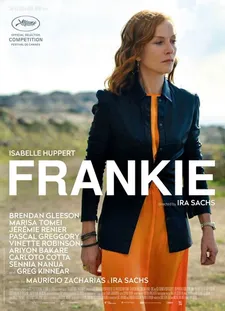 |
| Frankie Cannes poster |
AKT: … she gets a lot of outfits in there.
IH: Yes, she loves clothes like I do. You know, I could do the same [Isabel that afternoon was wearing a beautiful Burberry vest and jacket]. But in a subtle way.
Also the colours were really important because there was something very pictorial in the film. So the purple skirt and the orange dress in the end, I mean, all of that was part of the construction of the character.
AKT: And with the shoes comes a slight danger. We worry about her. When you walk in the forest in these shoes, we worry that one little step ...
IH: … she could easily twist her ankle, yes.
AKT: It's really interesting that the shoes provide more danger than any signs of physical ailment.
IH: You're right, absolutely.
AKT: The other thing, we somehow end up talking about are your wonderful bathing suits. I think it was an Eres one for [Guillaume Nicloux’s] Valley Of Love. And here you have a great bikini.
IH: Great bikini. Is it a bikini? Oh yes. Because I don't even have the top. Yes, it's a great bikini, beautiful colour. Purple.
AKT: Purple and very high-waisted. It looks great. In the end, you have a Caspar David Friedrich moment?
IH: Oui! Absolutely. When I said, like a Japanese painting, yes, but that's exactly what it is, a Caspar David Friedrich.
- Frankie will be released in the US on October 25 and in the UK on March 20, 2020.
- Huppert talks about the perpetual erotic charge in Frankie
Share this with others on...





















